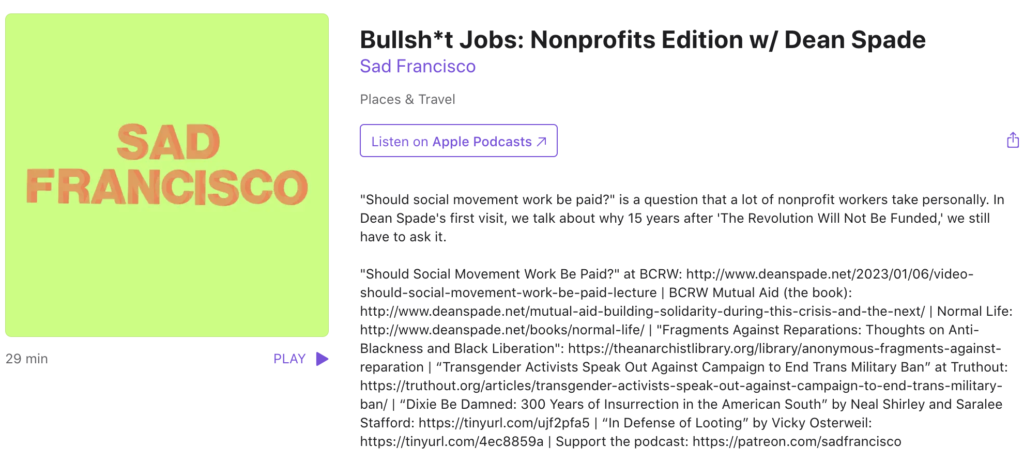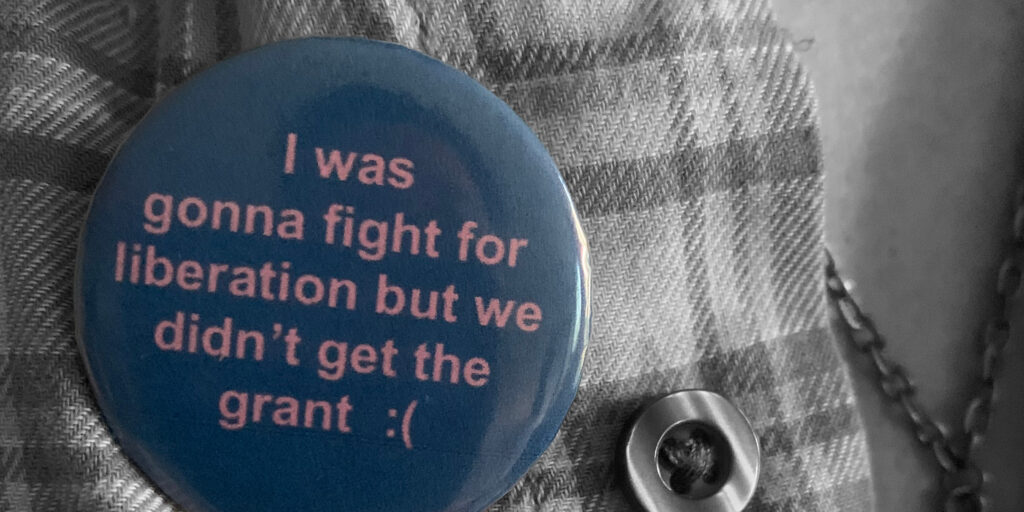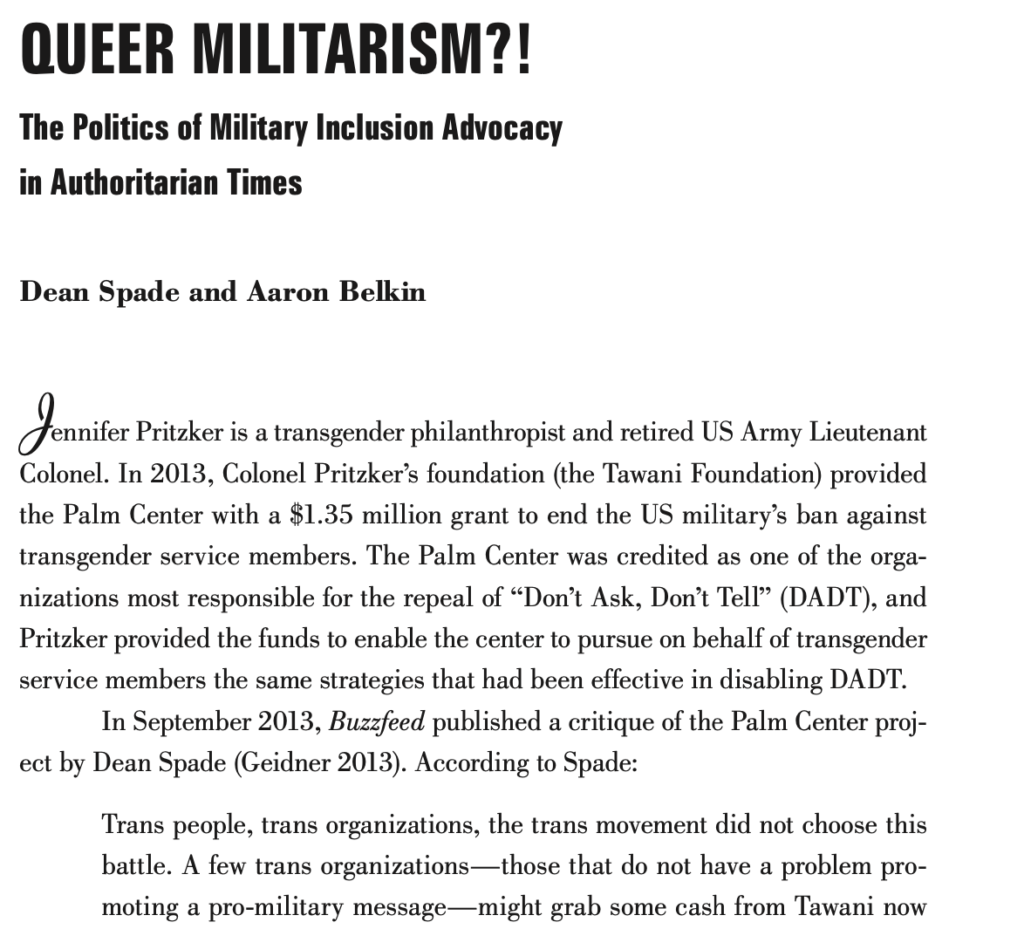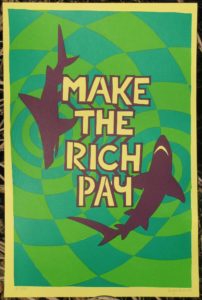
It was delightful, as always, to talk with Toshio Meronek about nonprofitization, queer resistance, gentrification, cops and more. Check it out.

It was delightful, as always, to talk with Toshio Meronek about nonprofitization, queer resistance, gentrification, cops and more. Check it out.
Should Social Movement Work be Paid?
Thursday, January 5, 2023
7PM EST/ 4PM PST
Sponsored by the Patricia Wismer Professorship in Gender and Diversity at Seattle University, and BCRW
REGISTER HERE: https://www.eventbrite.com/e/dean-spade-should-social-movement-work-be-paid-tickets-483783729157

The COVID pandemic and George Floyd/Brionna Taylor rebellion of 2020 brought new attention to the role of mutual aid work in surviving crises and organizing resistance. People started thousands of projects giving out food, rent money, and bail money, doing errands for each other, providing childcare, emotional support, transportation, and other essentials. Many people learned more about the histories of mutual aid in social movements as vectors of survival and mobilization. The long-time critique of non-profitization of social movements reached newly politicized people as debates surfaced about whether to register mutual aid projects as non-profits.
In this talk, Dean Spade will explore a vexing question being discussed in many movement groups: should people be paid to do this work? Should groups should seek funding to create staff positions or stipends for people participating in the work? Is it a matter of racial, economic, gender and disability justice to pay people to be part of movement groups? Does the process of raising money tie groups too closely to philanthropists or governments? Does paying participants limit the potential growth of movements? Is payment the best way to recognize labor in groups? Is paying people a good way to reduce barriers to participation? How does paying people impact the culture of social movement work? Does it institutionalize the work? These questions have immediate practical significance, and also unearth larger themes about what it means to do resistance organizing within capitalism where people are demobilized, isolated, and struggling to meet basic needs.
This event is a continuation of the Building Capacity for Mutual Aid Groups workshop series, which started as a series of four online workshops led by Dean Spade:
Workshop 1 – No Masters, No Flakes! (October 28, 2021)
Workshop 2 – Decision-Making (November 11, 2021)
Workshop 3 – Skills for Abolitionist Practice (December 9, 2021)
Workshop 4 – Bringing New People into the Work (January 20, 2022)
ACCESSIBILITY
ASL and live transcription will be provided. This event is made possible by the Patricia Wismer Professorship in Gender and Diversity at Seattle University.
Aaron Belkin and I just published this debate/conversation about our opposing views on trans military inclusion advocacy. I hope it will be a useful tool for classrooms and reading groups, and people wanting to understand this debate.

Today is a horrifying holiday dedicated to false narratives that attempt to cover over colonialism and genocide, and also a day when many people make an effort to “give back” by volunteering somewhere. Images of friendly upper class people volunteering at soup kitchens to feed homeless people articulate charity narratives that hide the actual causes and consequences of wealth and poverty.

I am sensing, all around me these days, how desperately frustrated, scared, and angry many people are about what is going on in the world around us–climate change, war-induced famine in Yemen, imprisoned children and parents at our borders and across the land, Amazon’s takeover of our food systems and cities, superstorms and disastrous fires, and so much more. I think a lot of people are wishing they knew more about how to plug in to processes of change they can believe in. I am frustrated watching misunderstandings about what change is and how it happens (“Care about poor people? Just volunteer in a soup kitchen once a year!”) circulate widely. I think their circulation is designed to demobilize us and keep us from participating in effective strategies to build the social conditions we want and need. So here is a very rough draft of a chart and some writing about the difference between “having a cause” as it is commonly described (or worse yet, the careerist version, “social justice entrepreneurship”), and living a life focused on our commitments to radical transformation. I hope it helps us imagine more creative, robust ways of being engaged with each other and the conditions we live in as we participate in resistance and transformation.
Continue reading ““Having a Cause” versus Living in a Life Centered in Radical Transformation”
I published a short essay in the new book, After Homosexual: The Legacies of Gay Liberation, edited by Carolyn D’Cruz and Mark Pendleton. The book reflects on the 40th anniversary of the publication of Dennis Altman’s Homosexual: Oppression and Liberation.
My essay, “Too Queer to Be Square,” looks at how queer politics has conservatized in the last 40 years and what queer and trans activists are doing to resist that.
Here is an interview I did with Natalie Oswin on Normal Life for Society and Space.
Paisley Currah and I co-edited the two-part special issue “The State We’re In: Locations of Coercion and Resistance in Trans Policy” in Sexuality Research and Social Policy: Journal of NSRC Vol. 4. No. 4 (December 2007) and Vol. 5, No. 1 (March 2008).
Read the introduction to the first volume here and read the introduction to the second volume here. A table of contents for both issues and links to most of the articles are below.
Part 1 (December 2007): Table of Contents
Introduction to Special Issue The State We’re In: Locations of Coercion and Resistance in Trans Policy, Part 1, Paisley Currah and Dean Spade
Unraveling Injustice: Race and Class Impact of Medicaid Exclusions of Transition-Related Health Care for Transgender People, Pooja S. Gehi and Gabriel Arkles
Sex Workers, Fem Queens, and Cross-Dressers: Differential Marginalizations and HIV Vulnerabilities Among Three Ethnocultural Male-to-Female Transgender Communities in New York City, Sel Julian Hwahng and Larry Nuttbrock
Seeking Refuge Under the Umbrella: Inclusion, Exclusion, and Organizing Within the Category Transgender, Megan Davidson
Transgender Health Benefits: Collateral Damage in the Resolution of the National Health Care Financing Dilemma, R. Nick Gorton
Momentum: A Photo Essay of the Transgender Community in the United States Over 30 Years, 1978–2007, Mariette Pathy Allen
Part 2 (March 2008): Table of Contents
Introduction to Special Issue The State We’re In: Locations of Coercion and Resistance in Trans Policy, Part 2, Dean Spade and Paisley Currah
Talking, Gawking, or Getting It Done: Provider Trainings to Increase Cultural and Clinical Competence for Transgender and Gender-Nonconforming Patients and Clients, Christoph Hanssmann, Darius Morrison, and Ellery Russian
Gender Identity and Hate Crimes: Violence Against Transgender People in Los Angeles County, Rebecca L. Stotzer
The Nonprofit Industrial Complex and Trans Resistance, Rickke Mananzala and Dean Spade
And by the Way, Do You Know He Thinks He’s a Girl? The Failures of Law, Policy, and Legal Representation for Transgender Youth in Juvenile Delinquency Courts, Jody Marksamer
I co-authored “The Non-Profit Industrial Complex and Trans Resistance” with Rickke Mananzala in Sexuality Research and Social Policy: Journal of National Sexuality Resource Center published in December 2007. You can read it here.